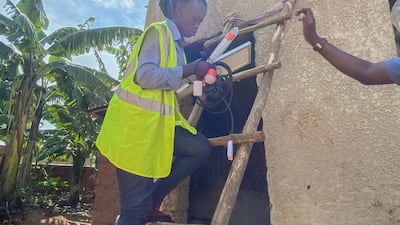Through the UAE Consensus reached at Cop28 in Dubai last December, negotiators secured historic commitments to expand renewable energy. Today, work is under way to deliver on that pledge, as governments, companies and civil society take action to increase access to affordable, clean power.
Nowhere is this transformation more urgently needed than in Africa, where 660 million people still live without electricity in their homes and hundreds of millions more rely on unstable grid connections. Expanding power at such a scale is difficult on its own – doing it sustainably is even harder.
To overcome these challenges and broaden the benefits of renewable energy, some argue that the grid model that worked in the West should be transplanted to emerging economies.
However, Africa’s vast lands, dispersed population and lack of last-mile technicians make utility-scale grids expensive and complicated to implement in many locations. Instead, mounting evidence shows that a decentralised approach is more effective.
Distributed Renewable Energy, or DRE, is an alternative to the traditional centralised power plant model of energy generation. In the DRE approach, energy is generated by small-scale devices, such as solar panels, close to the point of service. Instead of relying on one centralised grid, households and communities are able to generate their own energy in a more reliable, sustainable and affordable fashion. This energy can be used directly by the household or distributed elsewhere for a premium.

As a result, DRE offers a more flexible and faster way to turn on the lights in hard-to-reach communities. DRE systems can be installed anywhere, no matter how remote, and tap into Africa’s most abundant resource – sunlight. According to research published last year by the Oxford Institute for Energy Studies in the UK, the results are “increased access to electricity, cost savings, energy security, environmental benefits and job creation”.
Ignite Power, which won the Zayed Sustainability Prize in the Energy Category at Cop28, offers one example of how the DRE approach can succeed. Growing from its first project in Rwanda, the company is connecting deep-rural communities across Africa to reliable solar-based solutions. Propelled by the proceeds of the Zayed prize, Abu Dhabi-based Ignite now provides three million people in nine countries with electricity, irrigation, clean cooking and internet access.
Gaining access to these services creates a profound impact, regardless of the size of the system. With power, users can light their homes, charge their mobile phones and stay connected.
The impact goes deeper, too. In a survey conducted by Ignite across Mozambique and Rwanda, farmers report two extra hours of productivity each day because they can cook dinner after sunset. Family expenditures drop as they no longer need to visit local kiosks to charge their phones or pay for expensive kerosene. And 93 per cent of households say their children perform better in school when they have light to study after dark.
While DRE has been especially effective in reaching remote areas, the technology holds considerable promise in urban environments as well. In one report, the Resilient Cities Network and consultancy Arup highlight that many city dwellers in Africa reside in slum-like conditions without grid access. As urbanisation accelerates, DRE is an affordable and adaptable way to connect these communities, thus addressing not only climate concerns but also economic and social disparities.
The urban deployment of DRE has found success in Cape Town, South Africa where the Energy2040 initiative set more ambitious renewables targets and formed a directorate focused on implementing distributed solutions. The city of Cape Town has developed regulations to encourage decentralised generation, recognising the benefits for both power access and user fees.
Along those lines, DRE addresses important economic challenges with regard to energy distribution. In many developing-country contexts, consumers pay artificially low prices to draw energy from the grid, placing burdens on state budgets and power companies.
An analysis by the Rocky Mountain Institute, a US think tank, explains that DRE solutions in India have the potential to lessen the gap between revenue and costs, thereby delivering more economically and environmentally sustainable energy.
With current population growth exceeding electrification rates in many emerging economies, there is no time to waste. DRE has a vital role to play in achieving the Cop28 goal of tripling renewable energy globally as part of a just transition.
The UAE’s support for these types of innovative solutions through the Zayed prize is a fitting way to honour the legacy of its Founding Father, the late Sheikh Zayed bin Sultan Al Nahyan, as an environmentalist and humanitarian. It will also help cement the country’s position as a global leader in the growing climate tech sector.




































